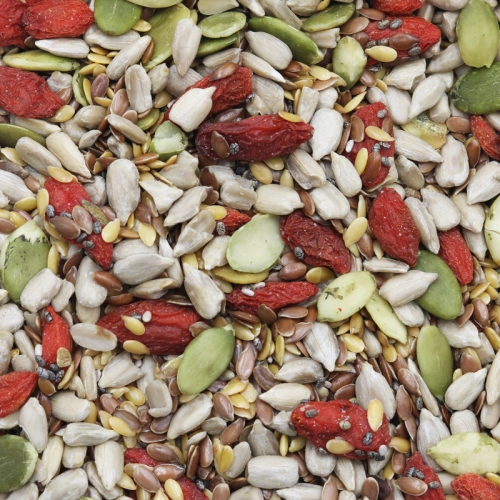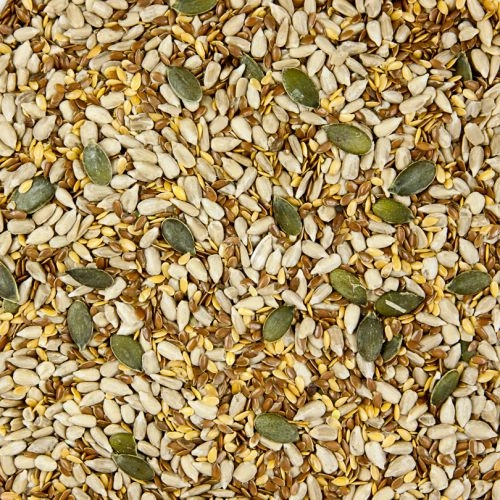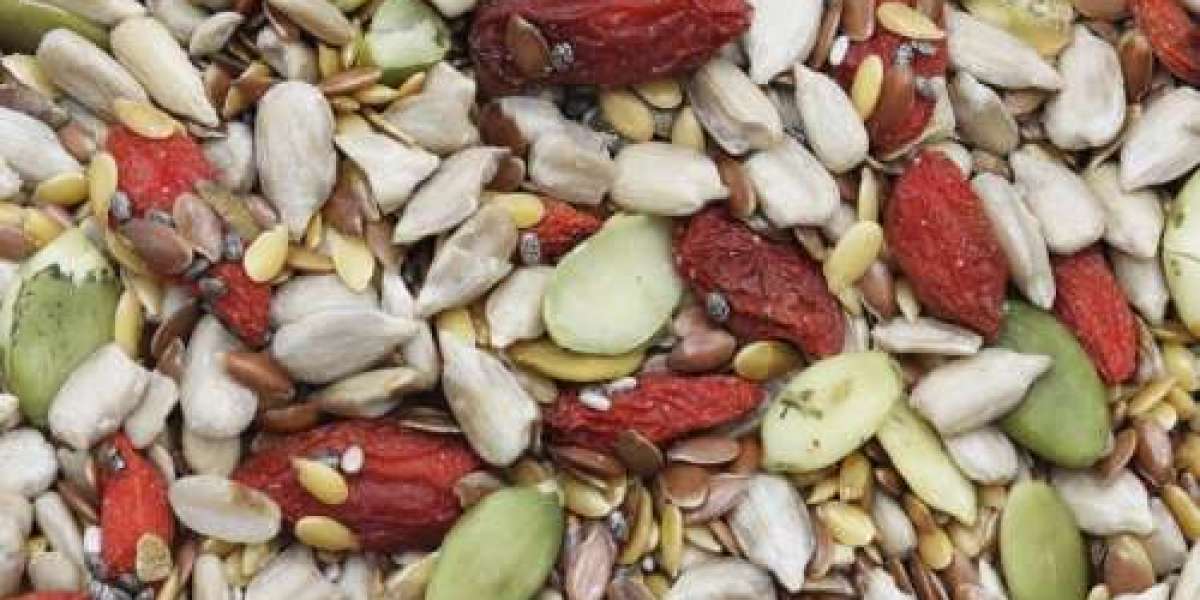Seeds have been a part of human diets for centuries, providing essential nutrients and health benefits. They may be small in size, but they pack a big punch when it comes to nutritional value. From chia to flax, sunflower to pumpkin, seeds are versatile, healthy, and can easily be incorporated into your daily diet. At Grape Tree, we offer a wide range of seeds to enhance your meals and boost your health.
In this article, we will explore the various types of seeds, their benefits, and how you can include them in your everyday meals.
Why Are Seeds Good for You?
Seeds are rich in essential nutrients such as healthy fats, protein, fibre, vitamins, and minerals. They are also high in antioxidants, which help protect your body from damage caused by free radicals. Additionally, many Seeds contain omega-3 fatty acids, which are crucial for heart health. Let's dive into the nutritional benefits of some popular seeds and discover how they can positively impact your health.
1. Chia Seeds
Chia seeds are tiny black or white seeds that come from the plant Salvia hispanica, which is native to Central America. Despite their small size, chia seeds are loaded with nutrients.
Nutritional Benefits:
Rich in fibre: Chia seeds are an excellent source of dietary fibre, which promotes healthy digestion and can help you feel fuller for longer.
Omega-3 Fatty Acids: They are one of the best plant-based sources of omega-3 fatty acids, which are important for brain health and reducing inflammation.
Protein and Antioxidants: Chia seeds also provide a decent amount of protein and antioxidants, which help protect your body from oxidative stress.

How to Use:
Chia seeds are incredibly versatile. You can sprinkle them on yogurt, blend them into smoothies, or mix them into oatmeal. One of the most popular ways to enjoy chia seeds is to make chia pudding by soaking them in liquid (like almond milk) overnight. The seeds expand and form a gel-like consistency, creating a delicious, nutritious treat.
2. Flaxseeds
Flaxseeds, also known as linseeds, are brown or golden seeds that are highly nutritious. They have been cultivated for thousands of years and are known for their many health benefits.
Nutritional Benefits:
High in fibre: Flaxseeds are an excellent source of both soluble and insoluble fibre, promoting digestive health and regular bowel movements.
Rich in Omega-3: Like chia seeds, flaxseeds are rich in alpha-linolenic acid (ALA), a type of omega-3 fatty acid that benefits heart health.
Lignans: Flaxseeds are one of the richest sources of lignans, which are plant compounds that have antioxidant and oestrogen properties. They may help reduce the risk of certain cancers, especially breast cancer.
How to Use:
Flaxseeds are best consumed ground rather than whole, as the body can absorb their nutrients more efficiently. Add ground flaxseeds to smoothies, cereals, or baked goods like muffins and bread for an extra boost of nutrition.
3. Sunflower Seeds
Sunflower seeds are the edible seeds of the sunflower plant (Helianthus annuus). These seeds are a popular snack and are also used in various dishes for their crunchy texture and nutty flavour.
Nutritional Benefits:
Rich in Healthy Fats: Sunflower seeds are a great source of unsaturated fats, which are important for maintaining heart health.
Vitamin E: These seeds are packed with vitamin E, a powerful antioxidant that helps protect cells from damage and supports immune function.
Minerals: Sunflower seeds are rich in magnesium, selenium, and copper, all of which play essential roles in bone health, antioxidant defence, and energy production.
How to Use:
Sunflower seeds are perfect for snacking on their own or adding to salads, granola, or yogurt. You can also use them to make sunflower seed butter, a great alternative to peanut butter.
4. Pumpkin Seeds
Pumpkin seeds, also known as pepitas, are the edible seeds of pumpkins. They are rich in various nutrients and have been associated with numerous health benefits.
Nutritional Benefits:
Magnesium-Rich: Pumpkin seeds are one of the best natural sources of magnesium, which is important for heart health, bone strength, and regulating blood sugar levels.
High in Zinc: These seeds provide a good amount of zinc, which is important for immune function, skin health, and wound healing.
Antioxidants: Pumpkin seeds contain antioxidants like carotenoids and vitamin E, which can help reduce inflammation and protect your cells from damage.
How to Use:
Pumpkin seeds can be eaten raw or roasted, making them a tasty and nutritious snack. They can also be sprinkled on top of salads, oatmeal, or yogurt for an added crunch. You can even use them in baking, adding them to bread or muffin recipes.
5. Hemp Seeds
Hemp seeds come from the Cannabis sativa plant, but unlike marijuana, they contain very low levels of THC, the compound responsible for psychoactive effects. These small seeds are incredibly nutritious and are considered a superfood.
Nutritional Benefits:
Complete Protein: Hemp seeds are one of the few plant-based sources of complete protein, meaning they contain all nine essential amino acids that your body cannot produce on its own.
Healthy Fats: Hemp seeds are rich in omega-3 and omega-6 fatty acids, which support heart health and reduce inflammation.
Vitamins and Minerals: They are also a good source of vitamin E, phosphorus, potassium, magnesium, and calcium, all essential for overall health.
How to Use:
Hemp seeds have a mild, nutty flavour and can be sprinkled on salads, yogurt, or cereal. You can also blend them into smoothies or use them to make hemp milk, a dairy-free alternative.

Incorporating Seeds into Your Diet
Including seeds in your daily diet is easy and can enhance the nutritional value of your meals. Here are some simple ways to add seeds to your diet:
Smoothies: Blend a tablespoon of chia seeds, flaxseeds, or hemp seeds into your morning smoothie for a protein and fibre boost.
Salads: Sprinkle sunflower seeds or pumpkin seeds on your salad for added crunch and nutrition.
Baking: Add seeds to your favourite baking recipes, such as bread, muffins, or energy bars.
Oatmeal and Yogurt: Mix chia seeds or flaxseeds into your oatmeal or yogurt for a nutrient-dense breakfast.
Snacks: Roasted pumpkin seeds and sunflower seeds make for a great, healthy snack that you can take with you on the go.
Why Choose Grape Tree for Seeds?
At Grape Tree, we are committed to offering high-quality seeds that are packed with essential nutrients to support your health. Our range includes chia seeds, flaxseeds, sunflower seeds, pumpkin seeds, and more, all sourced from trusted suppliers. Whether you’re looking to improve your heart health, boost your protein intake, or simply enjoy a healthy snack, our seeds are the perfect addition to your diet.
Explore our full range of seeds at Grape Tree and discover how these small powerhouses can make a big difference in your health and wellness.
Conclusion
Seeds are a simple yet effective way to boost your nutritional intake and support a healthy lifestyle. Rich in fibre, protein, healthy fats, and a range of vitamins and minerals, they offer numerous health benefits. Whether you’re looking to improve heart health, enhance digestion, or just enjoy a nutritious snack, seeds are a versatile and easy-to-use ingredient. At Grape Tree, we provide a wide variety of seeds to help you reap these health benefits. Start incorporating seeds into your diet today and experience the positive effects they can have on your overall well-being.








